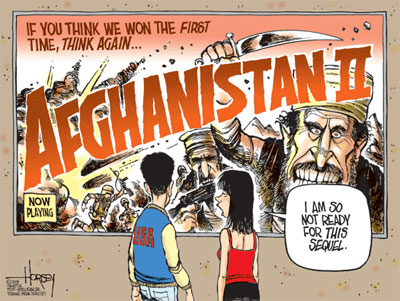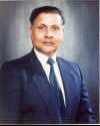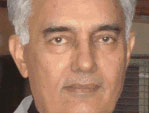The World’s Most Powerful Man, Appeared Least Powerful
By General Mirza Aslam Beg
While explaining the New Afghan Strategy President Barack Obama, the world’s most powerful man, appeared least powerful. He ordered a surge of 30,000 troops in Afghanistan, making a total of 100,000 supported by 45000 NATO troops.
Obama came to this decision "through a series of deliberations and getting a strategy for how to go forward and finish the job in Afghanistan." The president admits: "There ought to be an exit strategy for Afghanistan." Therefore, the underlying idea is not to win the war, but to ensure a safe exit. It is in this context, we have to examine the new strategy, in words and deeds, which in fact, is meant to cover the shame of defeat, which is difficult for a superpower to admit.
If winning the war was so vital for the sake of American interests, then 30,000 were not enough. At least 300,000 troops were needed to gain a favourable balance of power against the resistance, which according to CIA reports, is organised as Shadow Army, with 17 pisions under command, each pision having a number of lashkars.
The Shadow Army comprises old mujahideen who fought against the Soviets and the Taliban, with a hardcore of young fighters born under the shadow of war, who hold the banner of freedom. The veterans from Iraq and the new fighters from around the world have joined the lot. The Al-Qaeda 005 Brigade, which fought against the Soviets, has also joined the Shadow Army. Thus, the resistance has grown into a formidable force – a diehard, committed force – fighting for freedom against the occupation forces, who have no ideological commitment as such.
USA is following a similar policy as in the 1990s: "Goal is to prevent the return of Taliban," because they think that "if Taliban come to power, they will over-run Pakistan and destabilise the region." It’s totally fallacious because the Taliban ruled over most of Afghanistan from 1996 to 2001. Did they create any problem for anyone beyond their borders? In fact they are the only ones, who can bring peace in Afghanistan. They are the winners, and the winners are "not prepared to talk to the losers unless the loser gives the exact timeframe."
Now the occupation forces are facing the Taliban resistance which no government in the world supports, yet they are growing in strength, as Gulbadeen Hikmatyar, takes the oath of allegiance at the hands of Mullah Omar, and together they are prepared to inflict "a bigger defeat, bigger the number of enemy troops." In 1985, Gorbachev followed a similar strategy by inducting more troops and about half a dozen Spitnaz Brigades (commandos), and gave his commanders "a year to win the war."
Within a year, the Soviet army suffered badly and decided to withdraw. They approached the Pakistan government, to provide a safe exit. The army high command was also consulted and the Soviet army was provided a safe exit, and they withdrew unscathed.
So, the surge of 30,000 troops in Afghanistan poses no threat to Pakistan because these troops will be lost in the rocky wilderness of Afghanistan. The real threat is the consistent blame on Pakistan, by Obama, Manmohan Singh and Gordon Brown, for protecting Al-Qaeda safe havens, in our tribal areas, and the threat to strike them. The Government of Pakistan must tell them in very strong terms that there are no safe havens on the Pakistani soil, and if they dare take action, they themselves will be responsible for the consequences. If the Government of Pakistan does not pick up the courage to say so, let the armed forces of Pakistan, serve such a warning. And that warning must be served now.
The Soviets suffered about 15,000 deaths; however, the American deaths have not yet reached the figure of 900. The Soviets called their exit as "our bleeding wound." But for the Americans the situation is not that bad, yet they cannot win the war. The two centres of power, which can provide relief, are: The Taliban in Afghanistan and the Pakistan army.
Both have won the war against their adversaries. As in 1989, 20 years later now, they both are in a position to grant a safe exit to the occupation forces. History repeats itself. The central issue for peace in Afghanistan is the issue of power sharing by the Taliban, who cannot be cheated as in the 1990. And they are the only one who can bring peace and establish a stable government as they did, during the period 1996-2001. The fall of Berlin Wall, appears a smaller event, compared to the fall of US, EU and India, in Afghanistan, at the hands of the ragtag freedom fighters.
 The ‘political mess’ in Pakistan appears very frustrating on the surface, but from underneath, the ‘institutional forces’ have emerged to correct the course of national security interests, threatened by the machinations of our enemies. The nexus between CIA, RAW, Mossad and RAMA, have played havoc with the internal security and social peace in Pakistan.
The ‘political mess’ in Pakistan appears very frustrating on the surface, but from underneath, the ‘institutional forces’ have emerged to correct the course of national security interests, threatened by the machinations of our enemies. The nexus between CIA, RAW, Mossad and RAMA, have played havoc with the internal security and social peace in Pakistan.
The political government has failed to arrest the deteriorating situation causing such deep distrust and dismay amongst the broad masses of Pakistan. In fact people have started losing faith in democracy, because Zardari has refused to grant sovereignty to Parliament, maintaining the façade of a civilian dictorial rule. As the frustration grew, national institutions asserted themselves. The judiciary, supported by the lawyers, judges, media and the political opposition, regained its freedom and authority.
The armed forces of Pakistan came forward to correct the course, where the political government failed to respond. It corrected the course on the issue of Kerry-Lugar Bill; Nuclear proliferation; secularization of Pakistan; CIA and RAW involvement in Pakistan and a strong message to the nation that "the armed forces of Pakistan are fully conscious of the threat posed to national security and have the resolve and the capability to defeat such threats."
Thus, the job which a sovereign Parliament should have performed has been taken over by the armed forces of Pakistan which means "shifting of the centre of gravity from Islamabad to GHQ" – a situation which has exerted pressure on Zardari to abdicate his power and authority of the 17th Amendment and 58-2(b) in favour of Parliament. Ultimately, it would help Parliament to regain power and prestige and the shifting of the power base, back to Parliament. Thus, the ‘Pakistani fulcrum’, deriving strength from Parliament, would be able to play its due role, between Beijing, Kabul and Washington, leaving India behind "as one knotty strand in the Afghan tangle."
Furthermore, India failed to recognise this geo-strategic shift and opted to join hands with the American hegemon, to establish influence over Afghanistan and South Asia, which betrayed its colonial ambitions, which lie buried in the rocky mountains of Afghanistan. In fact, India is a retreating power. It has failed in Afghanistan, together with the Americans and NATO allies. Its military capabilities are also limited as it is passing through "the dangerous period of change and transformation" from the Russian to the American weapon systems, and is vulnerable and weak for at least the next decade. It poses no serious military threat to Pakistan.
 Out of the depths of sorrow and sacrifices, blunders and betrayals, destiny has offered to Pakistan such opportunities, which demand dynamic policies and plans, supported by aggressive diplomatic and political initiatives, to lift the nation and its morale from the abyss where it lies today. National institutions, such as the judiciary, armed forces and the media have played very timely and forceful roles, to correct the course. Similarly, the foreign policy makers – the ‘first line of defence’, have the responsibility to play the historic role, destiny has offered.
Out of the depths of sorrow and sacrifices, blunders and betrayals, destiny has offered to Pakistan such opportunities, which demand dynamic policies and plans, supported by aggressive diplomatic and political initiatives, to lift the nation and its morale from the abyss where it lies today. National institutions, such as the judiciary, armed forces and the media have played very timely and forceful roles, to correct the course. Similarly, the foreign policy makers – the ‘first line of defence’, have the responsibility to play the historic role, destiny has offered.
ABOUT THE AUTHOR: General Mirza Aslam Beg is former Chief of Army Staff, Pakistan. Now he is the Chairman of his Think Tank, FRIENDS based in Rawalpindi.

After graduating from college, I joined Pakistan Army and was commissioned in a Tank Regiment. I am a veteran of the Indo-Pakistan war. After leaving the Army, I joined IT as a profession. I was hired by Kuwait Air Force And Air Defence as an Adviser to computerize its entire operation. Here I was the Chief Coordinator of the Project, Kuwait Automated Support System (KASS). It was a state-of-the-art leading-edge technology where we established over 500 online terminals network with dedicated voice and data communications. It had Satellite linkups to connect with other systems and track the inventory movement for KAF & AD. On this project, I was coordinating with the US Navy, IBM World, AT&T, and Martin Marietta for the development, deployment, and operation of the KASS. Writing has always been a passion for me, been writing for 25 years for various newspapers and periodicals. Now for the last four years, I have formed my virtual Think Tank, Opinion Maker. Here we have some renowned writers from Pakistan and abroad who contribute regularly that’s helping the world opinion in some way. I am a keen golfer may not be a good one but play on a daily basis. I am also fond of using the camera to picture nature and people.
ATTENTION READERS
We See The World From All Sides and Want YOU To Be Fully InformedIn fact, intentional disinformation is a disgraceful scourge in media today. So to assuage any possible errant incorrect information posted herein, we strongly encourage you to seek corroboration from other non-VT sources before forming an educated opinion.
About VT - Policies & Disclosures - Comment Policy



